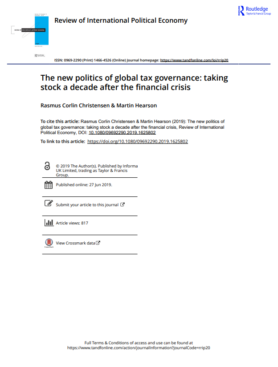Review of International Political Economy
The financial crisis of 2007–2009 is now broadly recognised as a once-in-a-generation inflection point in the history of global economic governance. It has also prompted a reconsideration of established paradigms in international political economy (IPE) scholarship. Developments in global tax governance open a window onto these ongoing changes, and in this essay we discuss four recent volumes on the topic drawn from IPE and beyond, arguing against an emphasis on institutional stability and analyses that consider taxation in isolation. In contrast, we identify unprecedented changes in tax cooperation that reflect a significant contemporary reconfiguration of the politics of global economic governance writ large. To develop these arguments, we discuss the links between global tax governance and four fundamental changes underway in IPE: the return of the state through more activist policies; the global power shift towards large emerging markets; the politics of austerity and populism; and the digitalisation of the economy.
